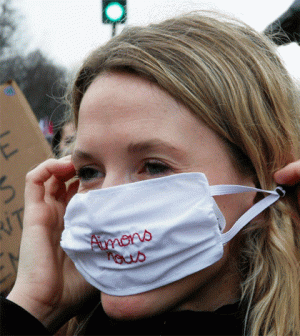- Finding Unshakable Power in a World That Wants to Pull Us ApartPosted 5 months ago
- What could a Donald Trump presidency mean for abortion rights?Posted 5 months ago
- Financial Empowerment: The Game-Changer for Women in Relationships and BeyondPosted 7 months ago
- Mental Health and Wellbeing Tips During and After PregnancyPosted 7 months ago
- Fall Renewal: Step outside your Comfort Zone & Experience Vibrant ChangePosted 7 months ago
- Women Entrepreneurs Need Support SystemsPosted 7 months ago
Women seen needing 60+ years to get equal with men in EU

By Elena Berton | Thomson Reuters Foundation
Pandemic risks slowing women’s progress still further as unpaid caring duties grow and paid work shrinks
PARIS, Oct 29 – European women are at least 60 years away from winning equality with men and the pandemic could further slow progress, according to a report released on Thursday that measures gender fairness.
The 2020 European Institute for Gender Equality (EIGE) index reported some advance in the last year but said women still do most of the unpaid work at home and face greater economic risks than men from COVID-19.
It said the pandemic has already increased domestic pressure on women, with more caring, cleaning and cooking to be done for the millions of families confined to home in lockdown.
“The coronavirus pandemic poses a serious threat to gender equality progress, which we cannot afford,” Carlien Scheele, EIGE’s director, said in a statement.
The index has monitored gender equality across the European Union for a decade, gauging how well women do against men in the worlds of work, money, knowledge, time, power and health.
It defines gender equality as “equal rights, responsibilities and opportunities of women and men” and scores individual member states along with the bloc as a whole.
If a score of one point signals inequality and 100 spells parity, the EU as a whole recorded 67.9 out of 100, showing an average improvement of half a point each year.
At that rate, it will take more than 60 years for the EU to achieve gender equality, the institute concluded, urging tailored policies to speed progress.
“We have the data to enable policymakers to do this and help ensure it doesn’t take another 60 years for the European Union to reach gender equality,” Scheele told reporters in a conference call. “We cannot be idle.”
WORK WINS
The gains of the past year were mostly scored in the sphere of paid work, the promotion of women to company boards and greater female representation in politics.
Gender segregation in education and the labour market remained problematic, with more women employed in health and social work than men. Women also do most of the unpaid care work, such as looking after ageing relatives or children.
Among the 28 member states, Sweden, Denmark and France kept their top spots, while Italy, Luxembourg and Malta improved the most, each gaining about 10 points since 2010. Greece, Hungary and Romania are the laggards, it said.
But even high-scoring nations can do more, EIGE researcher Lina Sanalauskaite told the Thomson Reuters Foundation.
“France has made the biggest improvement in the last 10 years, achieving progress in terms of income and decision-making. But we also have areas that could be improved, for example gender segregation in education, which leads to gender segregation in the labour market,” she said.
The private sector has been a key driver of change, in large part due to a better gender balance on company boards, but the impact of COVID-19 on women’s progress at work is a new risk that could further delay the 60-year wait for parity.
Physical distancing rules to slow the virus’s spread have had hit predominantly female workplaces, such as care, hospitality and education, with women’s employment falling more sharply than it did in the 2008 recession, the report said.
And the battle of the sexes long played out in physical workplaces is now being replicated in the virtual world, it said, with women who work online suffering worse pay and fewer options than their male counterparts.
“As our present and future are increasingly digital, we need to ensure that women and girls occupy their fair share of this sector and are encouraged to contribute towards its growth,” said European Commissioner for Equality Helena Dalli.
Related stories:
U.N. says pandemic will slow already miniscule progress in women’s rights
Women’s rights: 25 years of progress? Or not?
Britain urged to force companies to publish ethnicity pay gaps
(Editing by Lyndsay Griffiths and Helen Popper. Please credit the Thomson Reuters Foundation, the charitable arm of Thomson Reuters, that covers the lives of people around the world who struggle to live freely or fairly. Visit http://news.trust.org)
Our Standards: The Thomson Reuters Trust Principles.






